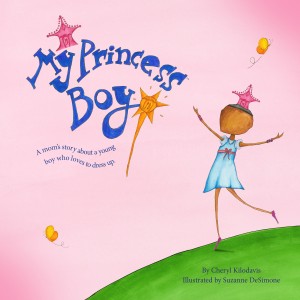 I recently received my copy of Cheryl Kilodavis’s newly-released picture book, My Princess Boy. The book shares what it’s like to be Dyson, Kilodavis’s four-year-old pink boy. Mostly his life is happy, and he dances in sparkly glory while his family loves and affirms him. But sometimes people laugh at or criticize him and his mom, and that hurts their feelings.
I recently received my copy of Cheryl Kilodavis’s newly-released picture book, My Princess Boy. The book shares what it’s like to be Dyson, Kilodavis’s four-year-old pink boy. Mostly his life is happy, and he dances in sparkly glory while his family loves and affirms him. But sometimes people laugh at or criticize him and his mom, and that hurts their feelings.
The message of My Princess Boy is that it’s okay to be who you are, even if some people get freaked out and make mean comments. And that’s a wonderful thing to say to boys like ours, who don’t hear affirming messages often enough. It’s great to see a book that reflects the realities—both the lovely and the harsh—of being a pink boy.
As a piece of modern children’s literature, the book has a nice rhythm and simple, effective language. It’s a professionally-printed self-published book with beautiful illustrations meant for the 3-6 year old set. The book is not perfect—there isn’t really a story line of the sort that one expects to find in a children’s picture book, and, as my five-year-old daughter Ruby pointed out, “It’s weird that the people in the book don’t have faces.” Despite its minor flaws, this book has already been hugely important in expanding the national conversation about diverse gender expression. Kilodavis has appeared on television and in print talking about her book, and I was so pleased to see that this week Dyson’s story appears in People magazine. The more people who are introduced to this book, the better.
I would have loved to read this book to Sam when he was in preschool. It would have helped him to see that he was not alone, even though there were no other boys in his preschool like him. Reading it to him would have told him that, in yet another way, his parents love him (and, as an eight-year-old who read it to himself the other day, Sam had a smile on his face). Seeing the book in his grandparents’ house, his school library, or his doctor’s office waiting room would have told him that his community supports him. Making the book part of his world’s ephemera would tell him: you are okay just the way you are. You are part of this world, as much as the other kids who appear in the books that surround you. You belong here, with the rest of us. You are not alone.
So buy a copy for yourself. Buy a copy for all the pink boys you know. Buy copies for their grandparents and friends and aunts and uncles. Ask school libraries and local bookstores to stock it. Donate it to your local library if they won’t stock it. Ask your child’s teacher to let you come and read the book to the class, or ask them to read it. Ask the storytime lady at your local library to read it. And, as I always implore you: talk, talk, talk about what you read in this book. Post it on facebook, chat about it at school drop-off, work it into casual conversation. Because that’s how we make change, by making things normal, an integrated part of life. And My Princess Boy is an important way to start that conversation.


